Effectiveness of ERP Implementation in Accounting Information Systems
VerifiedAdded on 2020/05/11
|28
|6233
|61
Report
AI Summary
This report analyzes the effectiveness of Enterprise Resource Planning (ERP) systems within Accounting Information Systems (AIS). It examines the advantages of ERP implementation, the usefulness of ERP in financial management, and the benefits realized by companies in Singapore. The research employs a secondary data collection method and thematic analysis to explore these themes, focusing on how ERP enhances internal control and improves the efficiency of accounting processes. The report reviews existing literature on the rationale of AIS, ERP systems, and their integration. Key findings highlight the positive impact of ERP on financial performance, decision-making, and operational efficiency. The report concludes with recommendations for future research, suggesting the exploration of contingency factors influencing AIS effectiveness.
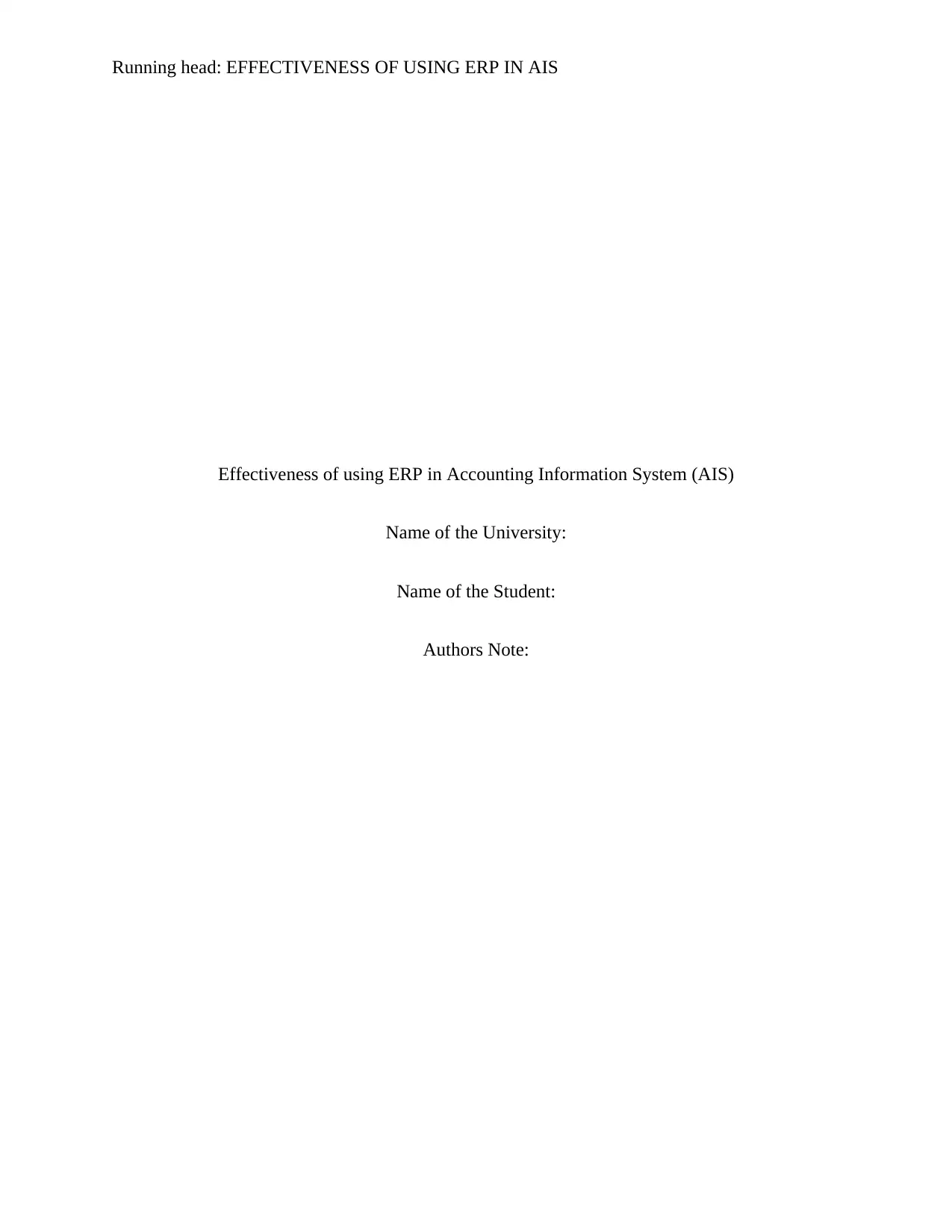
Running head: EFFECTIVENESS OF USING ERP IN AIS
Effectiveness of using ERP in Accounting Information System (AIS)
Name of the University:
Name of the Student:
Authors Note:
Effectiveness of using ERP in Accounting Information System (AIS)
Name of the University:
Name of the Student:
Authors Note:
Paraphrase This Document
Need a fresh take? Get an instant paraphrase of this document with our AI Paraphraser
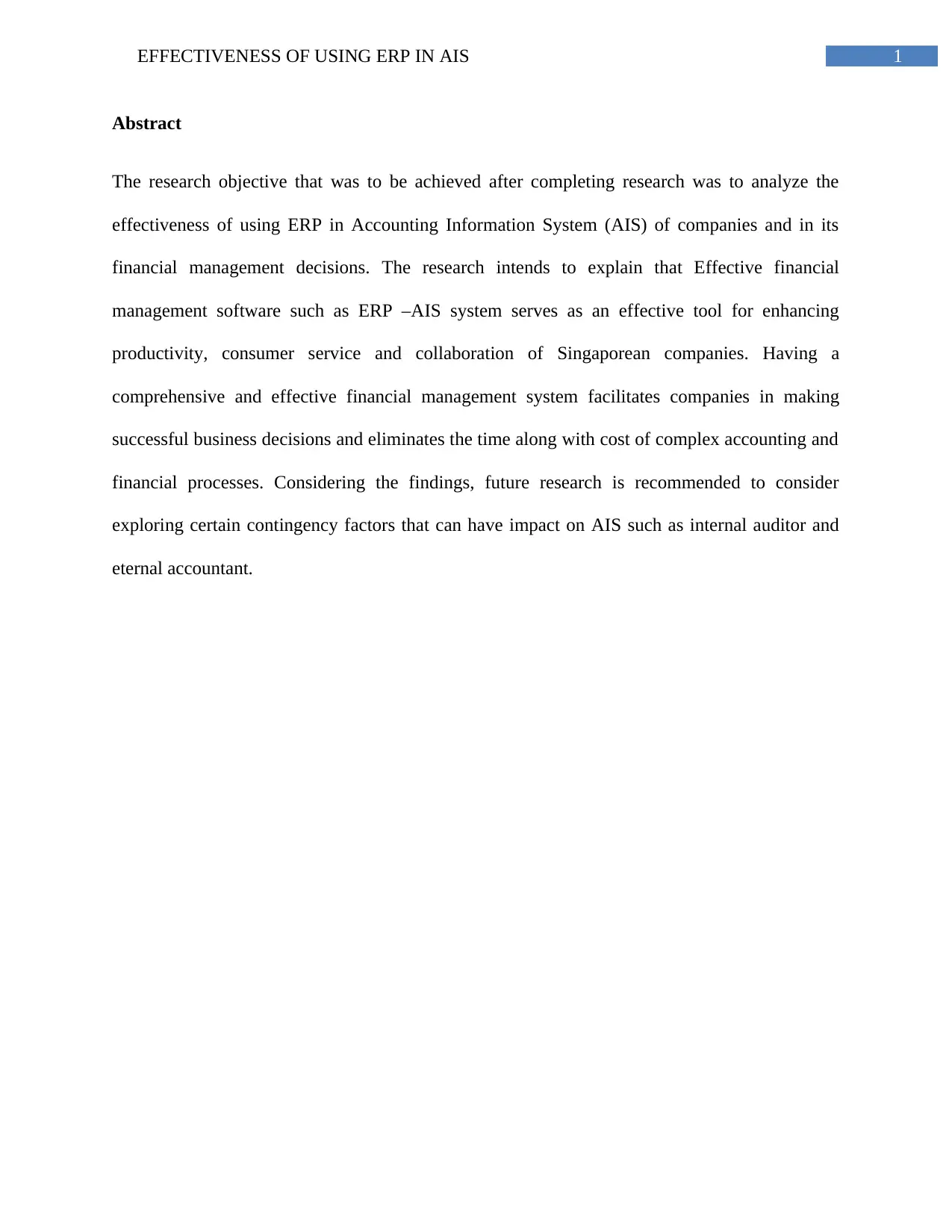
1EFFECTIVENESS OF USING ERP IN AIS
Abstract
The research objective that was to be achieved after completing research was to analyze the
effectiveness of using ERP in Accounting Information System (AIS) of companies and in its
financial management decisions. The research intends to explain that Effective financial
management software such as ERP –AIS system serves as an effective tool for enhancing
productivity, consumer service and collaboration of Singaporean companies. Having a
comprehensive and effective financial management system facilitates companies in making
successful business decisions and eliminates the time along with cost of complex accounting and
financial processes. Considering the findings, future research is recommended to consider
exploring certain contingency factors that can have impact on AIS such as internal auditor and
eternal accountant.
Abstract
The research objective that was to be achieved after completing research was to analyze the
effectiveness of using ERP in Accounting Information System (AIS) of companies and in its
financial management decisions. The research intends to explain that Effective financial
management software such as ERP –AIS system serves as an effective tool for enhancing
productivity, consumer service and collaboration of Singaporean companies. Having a
comprehensive and effective financial management system facilitates companies in making
successful business decisions and eliminates the time along with cost of complex accounting and
financial processes. Considering the findings, future research is recommended to consider
exploring certain contingency factors that can have impact on AIS such as internal auditor and
eternal accountant.
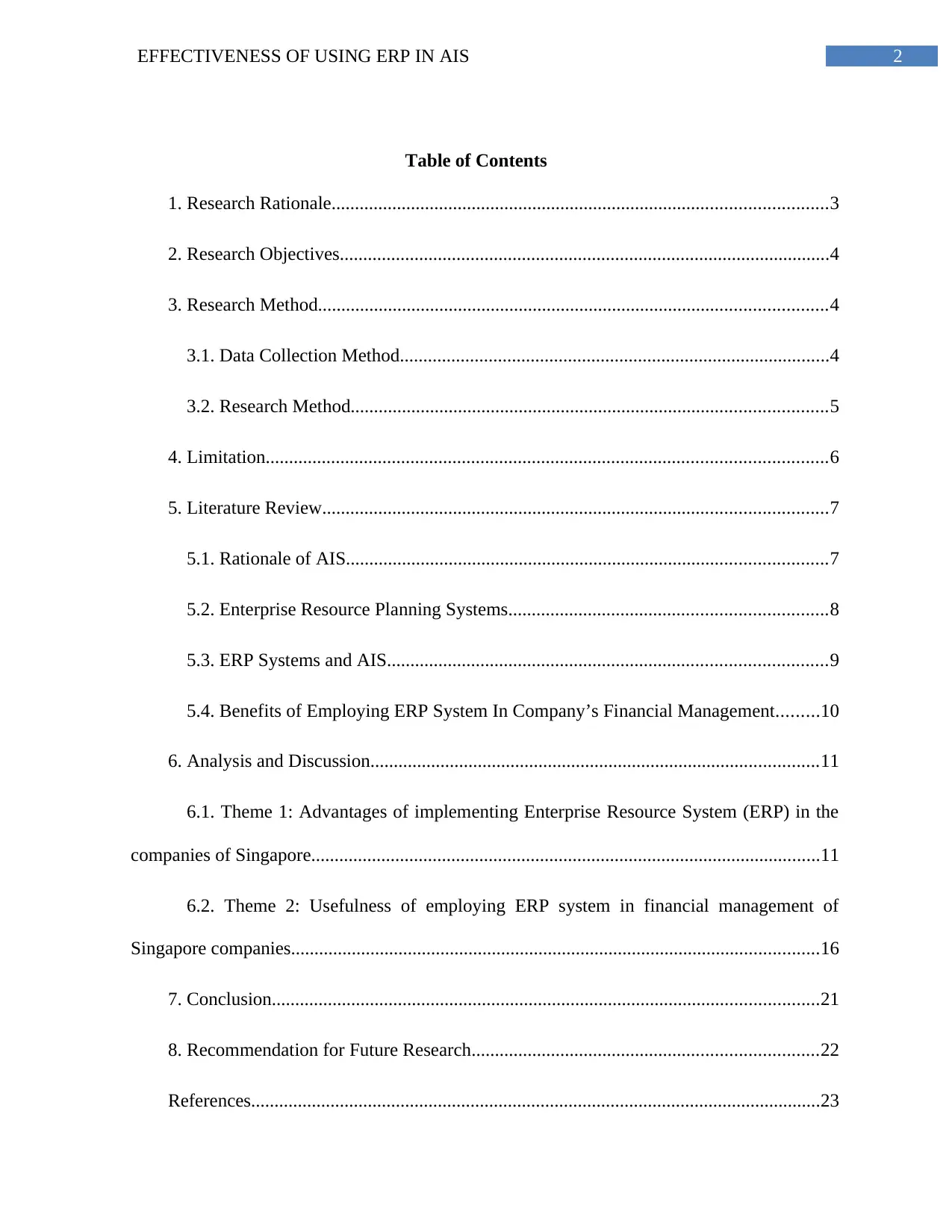
2EFFECTIVENESS OF USING ERP IN AIS
Table of Contents
1. Research Rationale..........................................................................................................3
2. Research Objectives.........................................................................................................4
3. Research Method.............................................................................................................4
3.1. Data Collection Method............................................................................................4
3.2. Research Method......................................................................................................5
4. Limitation........................................................................................................................6
5. Literature Review............................................................................................................7
5.1. Rationale of AIS.......................................................................................................7
5.2. Enterprise Resource Planning Systems....................................................................8
5.3. ERP Systems and AIS..............................................................................................9
5.4. Benefits of Employing ERP System In Company’s Financial Management.........10
6. Analysis and Discussion................................................................................................11
6.1. Theme 1: Advantages of implementing Enterprise Resource System (ERP) in the
companies of Singapore.............................................................................................................11
6.2. Theme 2: Usefulness of employing ERP system in financial management of
Singapore companies.................................................................................................................16
7. Conclusion.....................................................................................................................21
8. Recommendation for Future Research..........................................................................22
References..........................................................................................................................23
Table of Contents
1. Research Rationale..........................................................................................................3
2. Research Objectives.........................................................................................................4
3. Research Method.............................................................................................................4
3.1. Data Collection Method............................................................................................4
3.2. Research Method......................................................................................................5
4. Limitation........................................................................................................................6
5. Literature Review............................................................................................................7
5.1. Rationale of AIS.......................................................................................................7
5.2. Enterprise Resource Planning Systems....................................................................8
5.3. ERP Systems and AIS..............................................................................................9
5.4. Benefits of Employing ERP System In Company’s Financial Management.........10
6. Analysis and Discussion................................................................................................11
6.1. Theme 1: Advantages of implementing Enterprise Resource System (ERP) in the
companies of Singapore.............................................................................................................11
6.2. Theme 2: Usefulness of employing ERP system in financial management of
Singapore companies.................................................................................................................16
7. Conclusion.....................................................................................................................21
8. Recommendation for Future Research..........................................................................22
References..........................................................................................................................23
⊘ This is a preview!⊘
Do you want full access?
Subscribe today to unlock all pages.

Trusted by 1+ million students worldwide
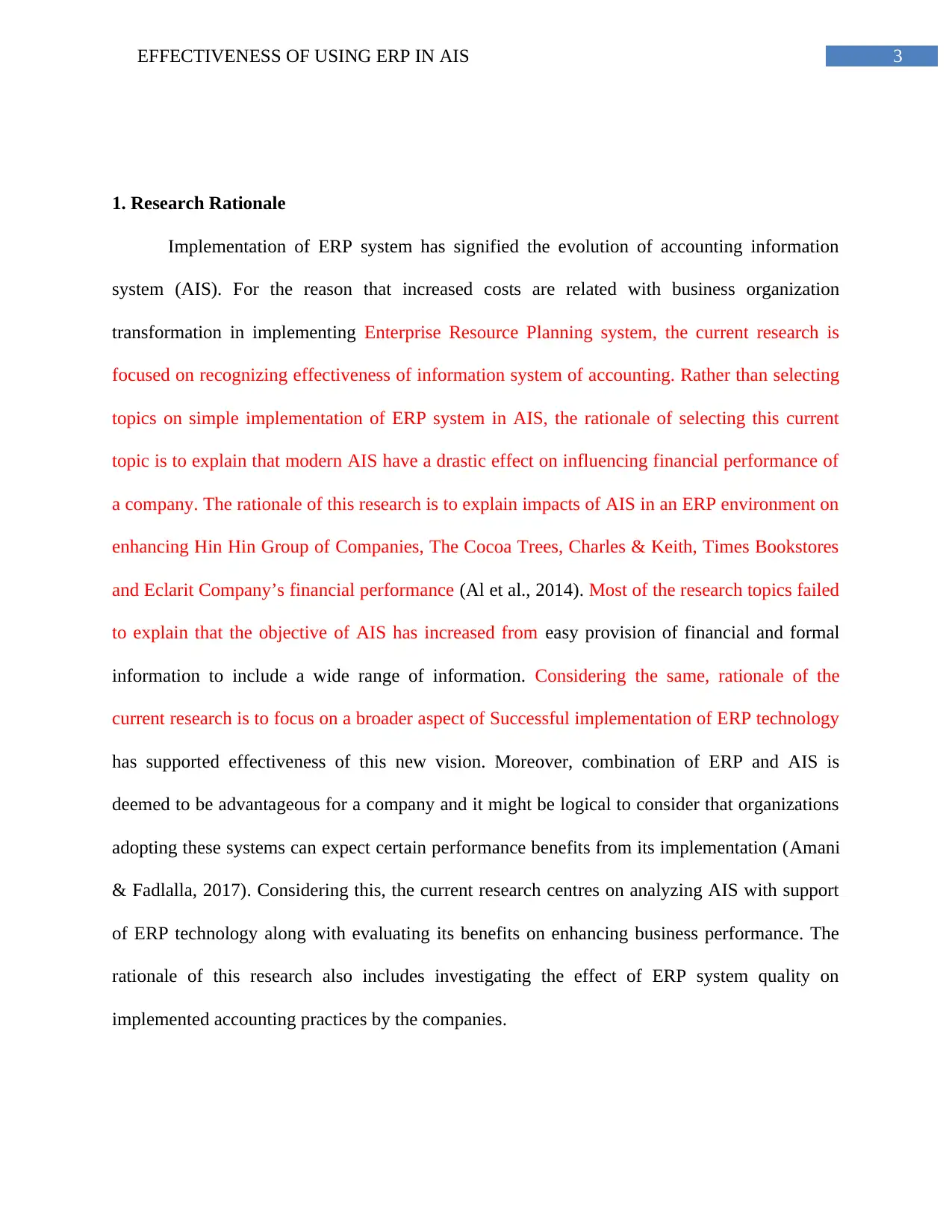
3EFFECTIVENESS OF USING ERP IN AIS
1. Research Rationale
Implementation of ERP system has signified the evolution of accounting information
system (AIS). For the reason that increased costs are related with business organization
transformation in implementing Enterprise Resource Planning system, the current research is
focused on recognizing effectiveness of information system of accounting. Rather than selecting
topics on simple implementation of ERP system in AIS, the rationale of selecting this current
topic is to explain that modern AIS have a drastic effect on influencing financial performance of
a company. The rationale of this research is to explain impacts of AIS in an ERP environment on
enhancing Hin Hin Group of Companies, The Cocoa Trees, Charles & Keith, Times Bookstores
and Eclarit Company’s financial performance (Al et al., 2014). Most of the research topics failed
to explain that the objective of AIS has increased from easy provision of financial and formal
information to include a wide range of information. Considering the same, rationale of the
current research is to focus on a broader aspect of Successful implementation of ERP technology
has supported effectiveness of this new vision. Moreover, combination of ERP and AIS is
deemed to be advantageous for a company and it might be logical to consider that organizations
adopting these systems can expect certain performance benefits from its implementation (Amani
& Fadlalla, 2017). Considering this, the current research centres on analyzing AIS with support
of ERP technology along with evaluating its benefits on enhancing business performance. The
rationale of this research also includes investigating the effect of ERP system quality on
implemented accounting practices by the companies.
1. Research Rationale
Implementation of ERP system has signified the evolution of accounting information
system (AIS). For the reason that increased costs are related with business organization
transformation in implementing Enterprise Resource Planning system, the current research is
focused on recognizing effectiveness of information system of accounting. Rather than selecting
topics on simple implementation of ERP system in AIS, the rationale of selecting this current
topic is to explain that modern AIS have a drastic effect on influencing financial performance of
a company. The rationale of this research is to explain impacts of AIS in an ERP environment on
enhancing Hin Hin Group of Companies, The Cocoa Trees, Charles & Keith, Times Bookstores
and Eclarit Company’s financial performance (Al et al., 2014). Most of the research topics failed
to explain that the objective of AIS has increased from easy provision of financial and formal
information to include a wide range of information. Considering the same, rationale of the
current research is to focus on a broader aspect of Successful implementation of ERP technology
has supported effectiveness of this new vision. Moreover, combination of ERP and AIS is
deemed to be advantageous for a company and it might be logical to consider that organizations
adopting these systems can expect certain performance benefits from its implementation (Amani
& Fadlalla, 2017). Considering this, the current research centres on analyzing AIS with support
of ERP technology along with evaluating its benefits on enhancing business performance. The
rationale of this research also includes investigating the effect of ERP system quality on
implemented accounting practices by the companies.
Paraphrase This Document
Need a fresh take? Get an instant paraphrase of this document with our AI Paraphraser
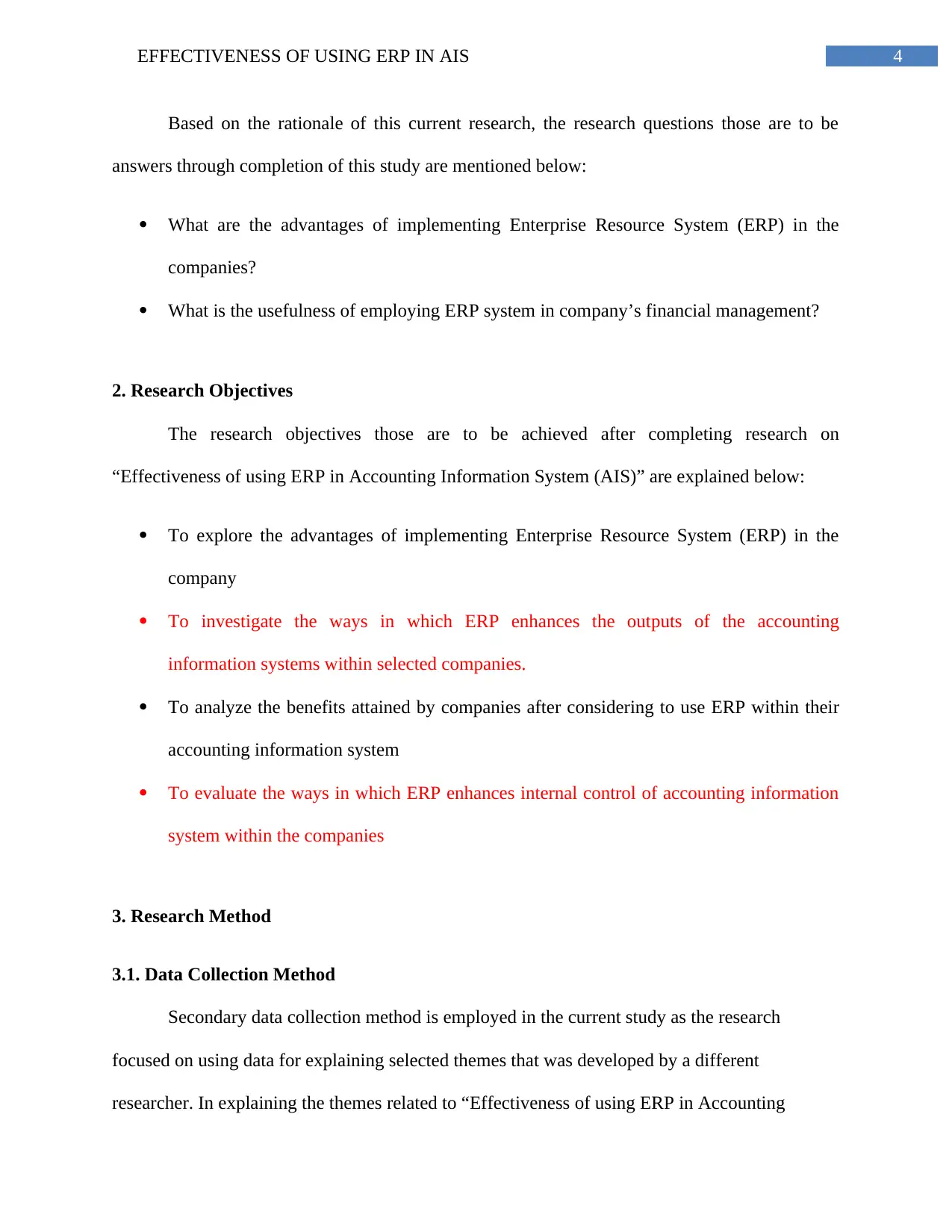
4EFFECTIVENESS OF USING ERP IN AIS
Based on the rationale of this current research, the research questions those are to be
answers through completion of this study are mentioned below:
What are the advantages of implementing Enterprise Resource System (ERP) in the
companies?
What is the usefulness of employing ERP system in company’s financial management?
2. Research Objectives
The research objectives those are to be achieved after completing research on
“Effectiveness of using ERP in Accounting Information System (AIS)” are explained below:
To explore the advantages of implementing Enterprise Resource System (ERP) in the
company
To investigate the ways in which ERP enhances the outputs of the accounting
information systems within selected companies.
To analyze the benefits attained by companies after considering to use ERP within their
accounting information system
To evaluate the ways in which ERP enhances internal control of accounting information
system within the companies
3. Research Method
3.1. Data Collection Method
Secondary data collection method is employed in the current study as the research
focused on using data for explaining selected themes that was developed by a different
researcher. In explaining the themes related to “Effectiveness of using ERP in Accounting
Based on the rationale of this current research, the research questions those are to be
answers through completion of this study are mentioned below:
What are the advantages of implementing Enterprise Resource System (ERP) in the
companies?
What is the usefulness of employing ERP system in company’s financial management?
2. Research Objectives
The research objectives those are to be achieved after completing research on
“Effectiveness of using ERP in Accounting Information System (AIS)” are explained below:
To explore the advantages of implementing Enterprise Resource System (ERP) in the
company
To investigate the ways in which ERP enhances the outputs of the accounting
information systems within selected companies.
To analyze the benefits attained by companies after considering to use ERP within their
accounting information system
To evaluate the ways in which ERP enhances internal control of accounting information
system within the companies
3. Research Method
3.1. Data Collection Method
Secondary data collection method is employed in the current study as the research
focused on using data for explaining selected themes that was developed by a different
researcher. In explaining the themes related to “Effectiveness of using ERP in Accounting
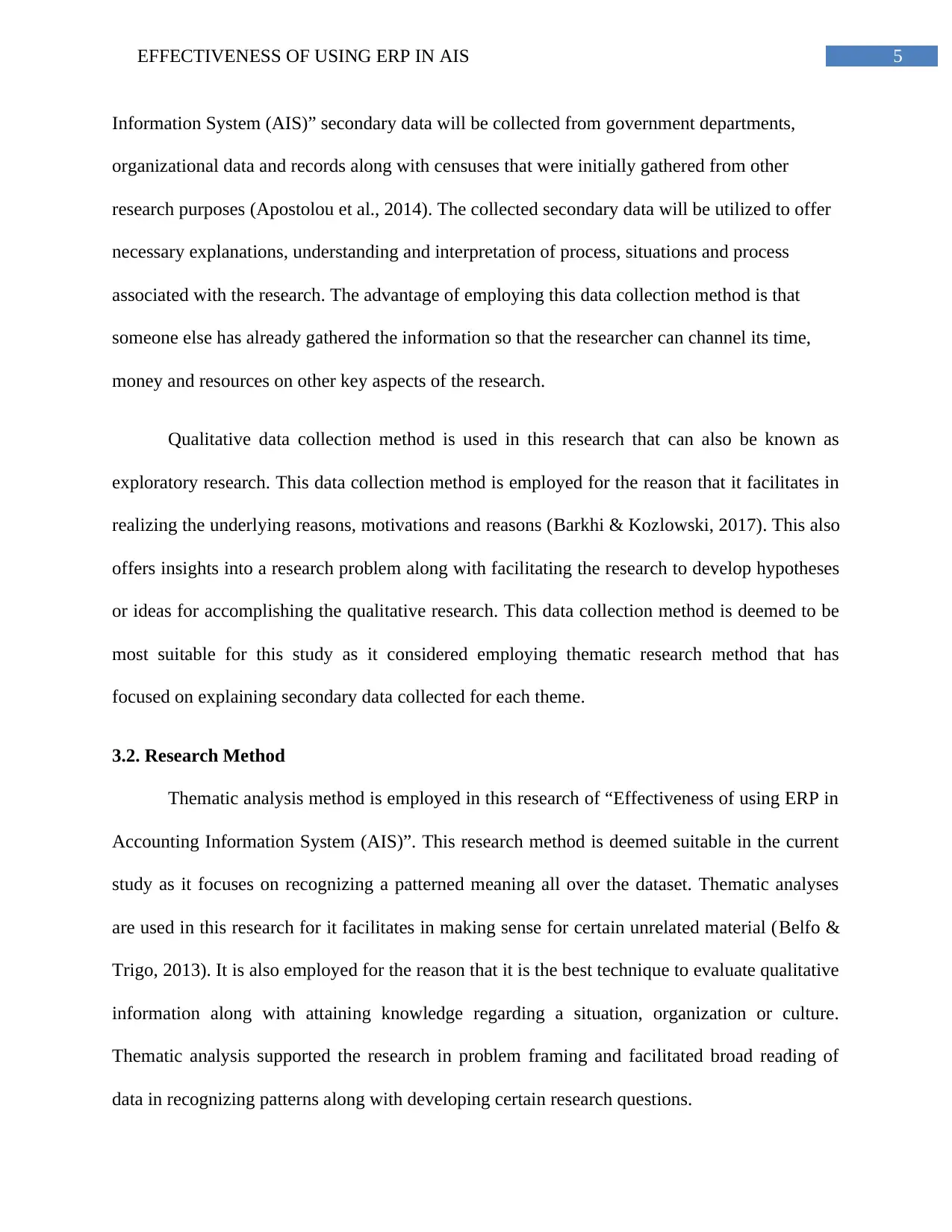
5EFFECTIVENESS OF USING ERP IN AIS
Information System (AIS)” secondary data will be collected from government departments,
organizational data and records along with censuses that were initially gathered from other
research purposes (Apostolou et al., 2014). The collected secondary data will be utilized to offer
necessary explanations, understanding and interpretation of process, situations and process
associated with the research. The advantage of employing this data collection method is that
someone else has already gathered the information so that the researcher can channel its time,
money and resources on other key aspects of the research.
Qualitative data collection method is used in this research that can also be known as
exploratory research. This data collection method is employed for the reason that it facilitates in
realizing the underlying reasons, motivations and reasons (Barkhi & Kozlowski, 2017). This also
offers insights into a research problem along with facilitating the research to develop hypotheses
or ideas for accomplishing the qualitative research. This data collection method is deemed to be
most suitable for this study as it considered employing thematic research method that has
focused on explaining secondary data collected for each theme.
3.2. Research Method
Thematic analysis method is employed in this research of “Effectiveness of using ERP in
Accounting Information System (AIS)”. This research method is deemed suitable in the current
study as it focuses on recognizing a patterned meaning all over the dataset. Thematic analyses
are used in this research for it facilitates in making sense for certain unrelated material (Belfo &
Trigo, 2013). It is also employed for the reason that it is the best technique to evaluate qualitative
information along with attaining knowledge regarding a situation, organization or culture.
Thematic analysis supported the research in problem framing and facilitated broad reading of
data in recognizing patterns along with developing certain research questions.
Information System (AIS)” secondary data will be collected from government departments,
organizational data and records along with censuses that were initially gathered from other
research purposes (Apostolou et al., 2014). The collected secondary data will be utilized to offer
necessary explanations, understanding and interpretation of process, situations and process
associated with the research. The advantage of employing this data collection method is that
someone else has already gathered the information so that the researcher can channel its time,
money and resources on other key aspects of the research.
Qualitative data collection method is used in this research that can also be known as
exploratory research. This data collection method is employed for the reason that it facilitates in
realizing the underlying reasons, motivations and reasons (Barkhi & Kozlowski, 2017). This also
offers insights into a research problem along with facilitating the research to develop hypotheses
or ideas for accomplishing the qualitative research. This data collection method is deemed to be
most suitable for this study as it considered employing thematic research method that has
focused on explaining secondary data collected for each theme.
3.2. Research Method
Thematic analysis method is employed in this research of “Effectiveness of using ERP in
Accounting Information System (AIS)”. This research method is deemed suitable in the current
study as it focuses on recognizing a patterned meaning all over the dataset. Thematic analyses
are used in this research for it facilitates in making sense for certain unrelated material (Belfo &
Trigo, 2013). It is also employed for the reason that it is the best technique to evaluate qualitative
information along with attaining knowledge regarding a situation, organization or culture.
Thematic analysis supported the research in problem framing and facilitated broad reading of
data in recognizing patterns along with developing certain research questions.
⊘ This is a preview!⊘
Do you want full access?
Subscribe today to unlock all pages.

Trusted by 1+ million students worldwide
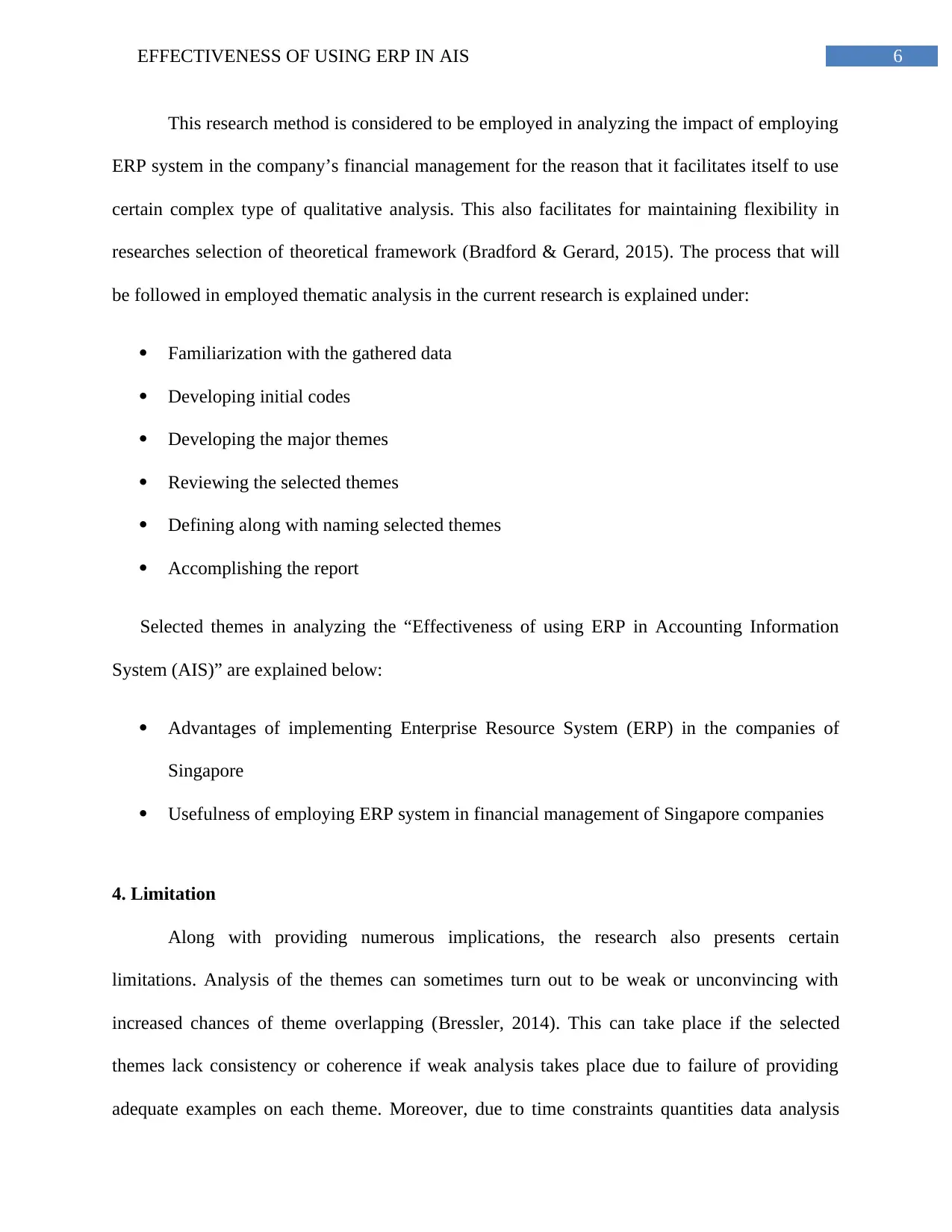
6EFFECTIVENESS OF USING ERP IN AIS
This research method is considered to be employed in analyzing the impact of employing
ERP system in the company’s financial management for the reason that it facilitates itself to use
certain complex type of qualitative analysis. This also facilitates for maintaining flexibility in
researches selection of theoretical framework (Bradford & Gerard, 2015). The process that will
be followed in employed thematic analysis in the current research is explained under:
Familiarization with the gathered data
Developing initial codes
Developing the major themes
Reviewing the selected themes
Defining along with naming selected themes
Accomplishing the report
Selected themes in analyzing the “Effectiveness of using ERP in Accounting Information
System (AIS)” are explained below:
Advantages of implementing Enterprise Resource System (ERP) in the companies of
Singapore
Usefulness of employing ERP system in financial management of Singapore companies
4. Limitation
Along with providing numerous implications, the research also presents certain
limitations. Analysis of the themes can sometimes turn out to be weak or unconvincing with
increased chances of theme overlapping (Bressler, 2014). This can take place if the selected
themes lack consistency or coherence if weak analysis takes place due to failure of providing
adequate examples on each theme. Moreover, due to time constraints quantities data analysis
This research method is considered to be employed in analyzing the impact of employing
ERP system in the company’s financial management for the reason that it facilitates itself to use
certain complex type of qualitative analysis. This also facilitates for maintaining flexibility in
researches selection of theoretical framework (Bradford & Gerard, 2015). The process that will
be followed in employed thematic analysis in the current research is explained under:
Familiarization with the gathered data
Developing initial codes
Developing the major themes
Reviewing the selected themes
Defining along with naming selected themes
Accomplishing the report
Selected themes in analyzing the “Effectiveness of using ERP in Accounting Information
System (AIS)” are explained below:
Advantages of implementing Enterprise Resource System (ERP) in the companies of
Singapore
Usefulness of employing ERP system in financial management of Singapore companies
4. Limitation
Along with providing numerous implications, the research also presents certain
limitations. Analysis of the themes can sometimes turn out to be weak or unconvincing with
increased chances of theme overlapping (Bressler, 2014). This can take place if the selected
themes lack consistency or coherence if weak analysis takes place due to failure of providing
adequate examples on each theme. Moreover, due to time constraints quantities data analysis
Paraphrase This Document
Need a fresh take? Get an instant paraphrase of this document with our AI Paraphraser
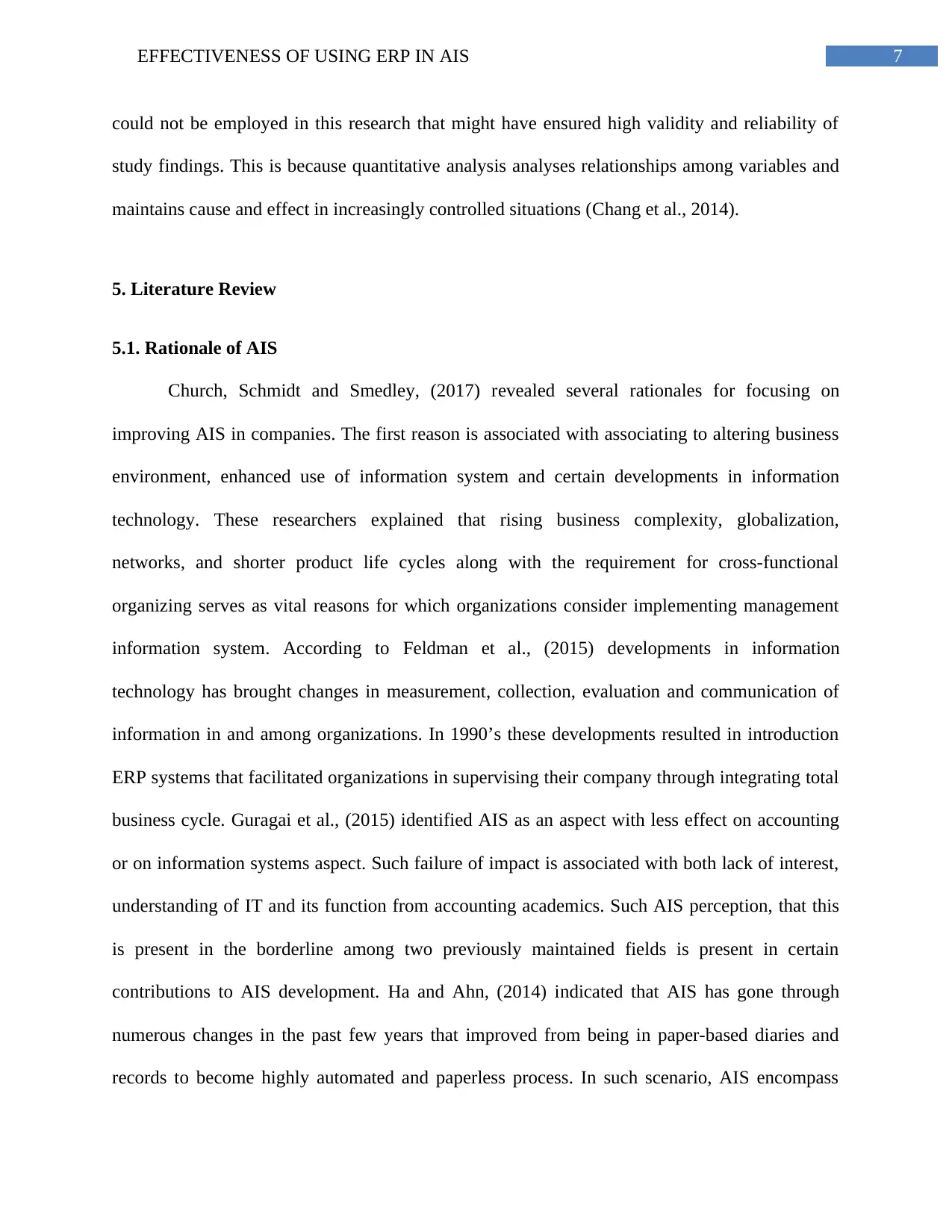
7EFFECTIVENESS OF USING ERP IN AIS
could not be employed in this research that might have ensured high validity and reliability of
study findings. This is because quantitative analysis analyses relationships among variables and
maintains cause and effect in increasingly controlled situations (Chang et al., 2014).
5. Literature Review
5.1. Rationale of AIS
Church, Schmidt and Smedley, (2017) revealed several rationales for focusing on
improving AIS in companies. The first reason is associated with associating to altering business
environment, enhanced use of information system and certain developments in information
technology. These researchers explained that rising business complexity, globalization,
networks, and shorter product life cycles along with the requirement for cross-functional
organizing serves as vital reasons for which organizations consider implementing management
information system. According to Feldman et al., (2015) developments in information
technology has brought changes in measurement, collection, evaluation and communication of
information in and among organizations. In 1990’s these developments resulted in introduction
ERP systems that facilitated organizations in supervising their company through integrating total
business cycle. Guragai et al., (2015) identified AIS as an aspect with less effect on accounting
or on information systems aspect. Such failure of impact is associated with both lack of interest,
understanding of IT and its function from accounting academics. Such AIS perception, that this
is present in the borderline among two previously maintained fields is present in certain
contributions to AIS development. Ha and Ahn, (2014) indicated that AIS has gone through
numerous changes in the past few years that improved from being in paper-based diaries and
records to become highly automated and paperless process. In such scenario, AIS encompass
could not be employed in this research that might have ensured high validity and reliability of
study findings. This is because quantitative analysis analyses relationships among variables and
maintains cause and effect in increasingly controlled situations (Chang et al., 2014).
5. Literature Review
5.1. Rationale of AIS
Church, Schmidt and Smedley, (2017) revealed several rationales for focusing on
improving AIS in companies. The first reason is associated with associating to altering business
environment, enhanced use of information system and certain developments in information
technology. These researchers explained that rising business complexity, globalization,
networks, and shorter product life cycles along with the requirement for cross-functional
organizing serves as vital reasons for which organizations consider implementing management
information system. According to Feldman et al., (2015) developments in information
technology has brought changes in measurement, collection, evaluation and communication of
information in and among organizations. In 1990’s these developments resulted in introduction
ERP systems that facilitated organizations in supervising their company through integrating total
business cycle. Guragai et al., (2015) identified AIS as an aspect with less effect on accounting
or on information systems aspect. Such failure of impact is associated with both lack of interest,
understanding of IT and its function from accounting academics. Such AIS perception, that this
is present in the borderline among two previously maintained fields is present in certain
contributions to AIS development. Ha and Ahn, (2014) indicated that AIS has gone through
numerous changes in the past few years that improved from being in paper-based diaries and
records to become highly automated and paperless process. In such scenario, AIS encompass
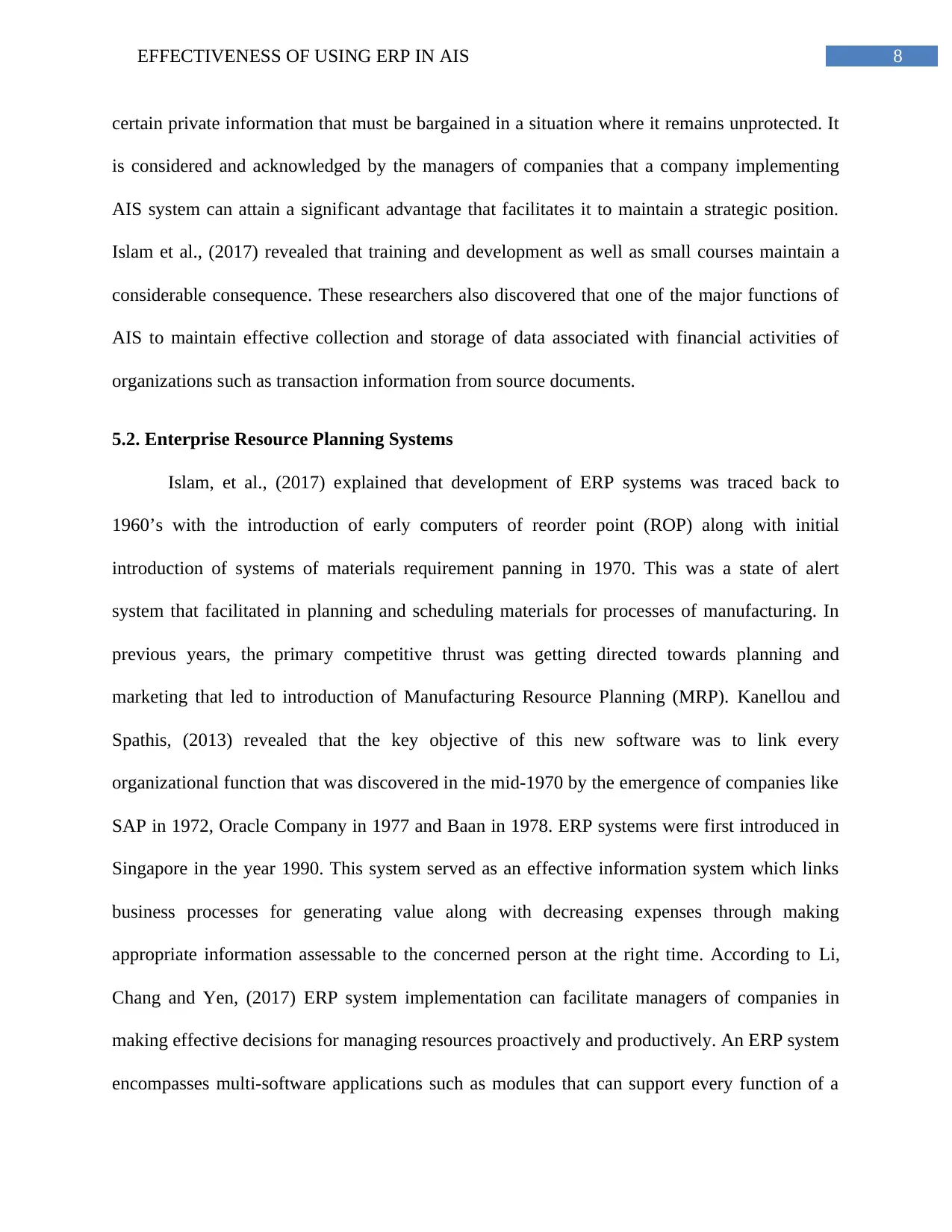
8EFFECTIVENESS OF USING ERP IN AIS
certain private information that must be bargained in a situation where it remains unprotected. It
is considered and acknowledged by the managers of companies that a company implementing
AIS system can attain a significant advantage that facilitates it to maintain a strategic position.
Islam et al., (2017) revealed that training and development as well as small courses maintain a
considerable consequence. These researchers also discovered that one of the major functions of
AIS to maintain effective collection and storage of data associated with financial activities of
organizations such as transaction information from source documents.
5.2. Enterprise Resource Planning Systems
Islam, et al., (2017) explained that development of ERP systems was traced back to
1960’s with the introduction of early computers of reorder point (ROP) along with initial
introduction of systems of materials requirement panning in 1970. This was a state of alert
system that facilitated in planning and scheduling materials for processes of manufacturing. In
previous years, the primary competitive thrust was getting directed towards planning and
marketing that led to introduction of Manufacturing Resource Planning (MRP). Kanellou and
Spathis, (2013) revealed that the key objective of this new software was to link every
organizational function that was discovered in the mid-1970 by the emergence of companies like
SAP in 1972, Oracle Company in 1977 and Baan in 1978. ERP systems were first introduced in
Singapore in the year 1990. This system served as an effective information system which links
business processes for generating value along with decreasing expenses through making
appropriate information assessable to the concerned person at the right time. According to Li,
Chang and Yen, (2017) ERP system implementation can facilitate managers of companies in
making effective decisions for managing resources proactively and productively. An ERP system
encompasses multi-software applications such as modules that can support every function of a
certain private information that must be bargained in a situation where it remains unprotected. It
is considered and acknowledged by the managers of companies that a company implementing
AIS system can attain a significant advantage that facilitates it to maintain a strategic position.
Islam et al., (2017) revealed that training and development as well as small courses maintain a
considerable consequence. These researchers also discovered that one of the major functions of
AIS to maintain effective collection and storage of data associated with financial activities of
organizations such as transaction information from source documents.
5.2. Enterprise Resource Planning Systems
Islam, et al., (2017) explained that development of ERP systems was traced back to
1960’s with the introduction of early computers of reorder point (ROP) along with initial
introduction of systems of materials requirement panning in 1970. This was a state of alert
system that facilitated in planning and scheduling materials for processes of manufacturing. In
previous years, the primary competitive thrust was getting directed towards planning and
marketing that led to introduction of Manufacturing Resource Planning (MRP). Kanellou and
Spathis, (2013) revealed that the key objective of this new software was to link every
organizational function that was discovered in the mid-1970 by the emergence of companies like
SAP in 1972, Oracle Company in 1977 and Baan in 1978. ERP systems were first introduced in
Singapore in the year 1990. This system served as an effective information system which links
business processes for generating value along with decreasing expenses through making
appropriate information assessable to the concerned person at the right time. According to Li,
Chang and Yen, (2017) ERP system implementation can facilitate managers of companies in
making effective decisions for managing resources proactively and productively. An ERP system
encompasses multi-software applications such as modules that can support every function of a
⊘ This is a preview!⊘
Do you want full access?
Subscribe today to unlock all pages.

Trusted by 1+ million students worldwide
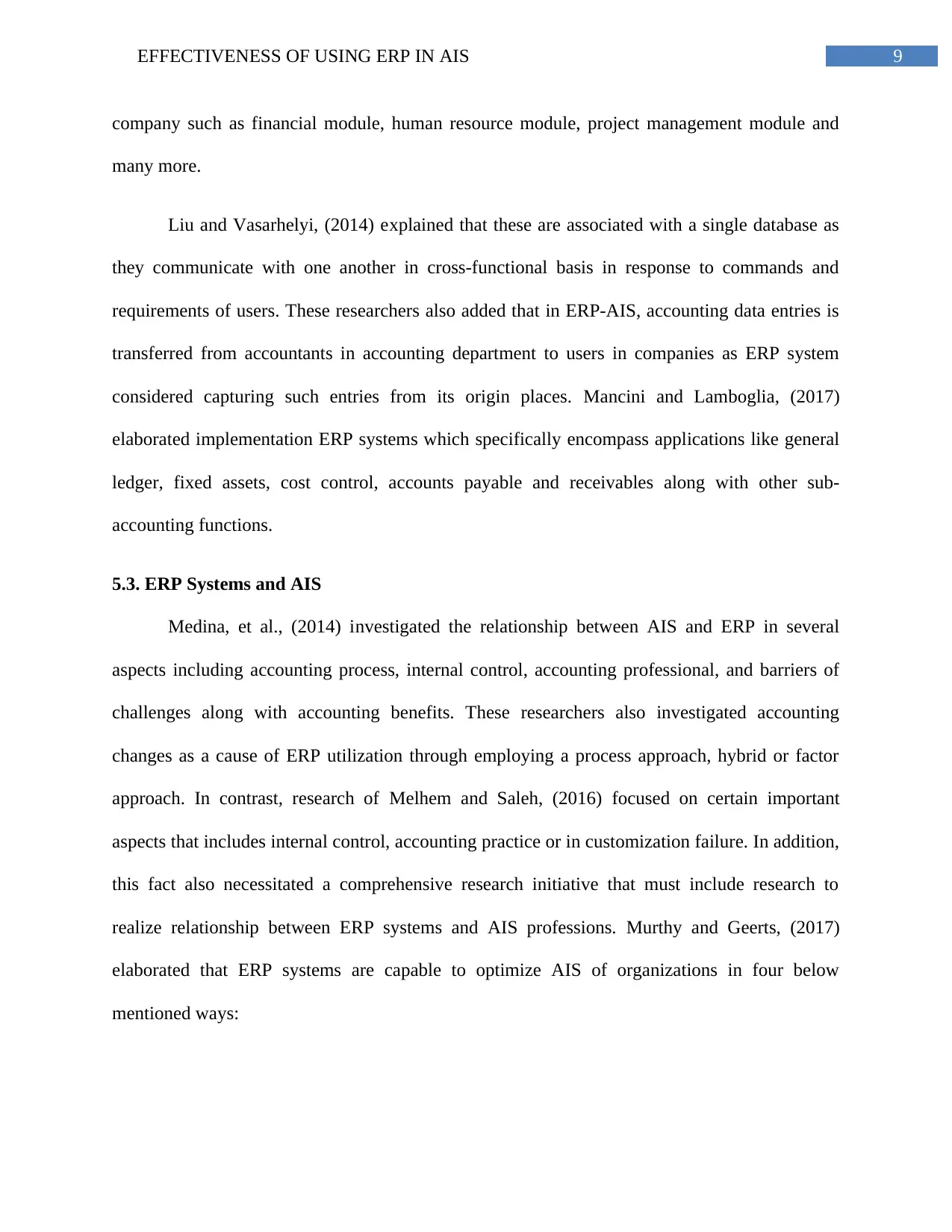
9EFFECTIVENESS OF USING ERP IN AIS
company such as financial module, human resource module, project management module and
many more.
Liu and Vasarhelyi, (2014) explained that these are associated with a single database as
they communicate with one another in cross-functional basis in response to commands and
requirements of users. These researchers also added that in ERP-AIS, accounting data entries is
transferred from accountants in accounting department to users in companies as ERP system
considered capturing such entries from its origin places. Mancini and Lamboglia, (2017)
elaborated implementation ERP systems which specifically encompass applications like general
ledger, fixed assets, cost control, accounts payable and receivables along with other sub-
accounting functions.
5.3. ERP Systems and AIS
Medina, et al., (2014) investigated the relationship between AIS and ERP in several
aspects including accounting process, internal control, accounting professional, and barriers of
challenges along with accounting benefits. These researchers also investigated accounting
changes as a cause of ERP utilization through employing a process approach, hybrid or factor
approach. In contrast, research of Melhem and Saleh, (2016) focused on certain important
aspects that includes internal control, accounting practice or in customization failure. In addition,
this fact also necessitated a comprehensive research initiative that must include research to
realize relationship between ERP systems and AIS professions. Murthy and Geerts, (2017)
elaborated that ERP systems are capable to optimize AIS of organizations in four below
mentioned ways:
company such as financial module, human resource module, project management module and
many more.
Liu and Vasarhelyi, (2014) explained that these are associated with a single database as
they communicate with one another in cross-functional basis in response to commands and
requirements of users. These researchers also added that in ERP-AIS, accounting data entries is
transferred from accountants in accounting department to users in companies as ERP system
considered capturing such entries from its origin places. Mancini and Lamboglia, (2017)
elaborated implementation ERP systems which specifically encompass applications like general
ledger, fixed assets, cost control, accounts payable and receivables along with other sub-
accounting functions.
5.3. ERP Systems and AIS
Medina, et al., (2014) investigated the relationship between AIS and ERP in several
aspects including accounting process, internal control, accounting professional, and barriers of
challenges along with accounting benefits. These researchers also investigated accounting
changes as a cause of ERP utilization through employing a process approach, hybrid or factor
approach. In contrast, research of Melhem and Saleh, (2016) focused on certain important
aspects that includes internal control, accounting practice or in customization failure. In addition,
this fact also necessitated a comprehensive research initiative that must include research to
realize relationship between ERP systems and AIS professions. Murthy and Geerts, (2017)
elaborated that ERP systems are capable to optimize AIS of organizations in four below
mentioned ways:
Paraphrase This Document
Need a fresh take? Get an instant paraphrase of this document with our AI Paraphraser
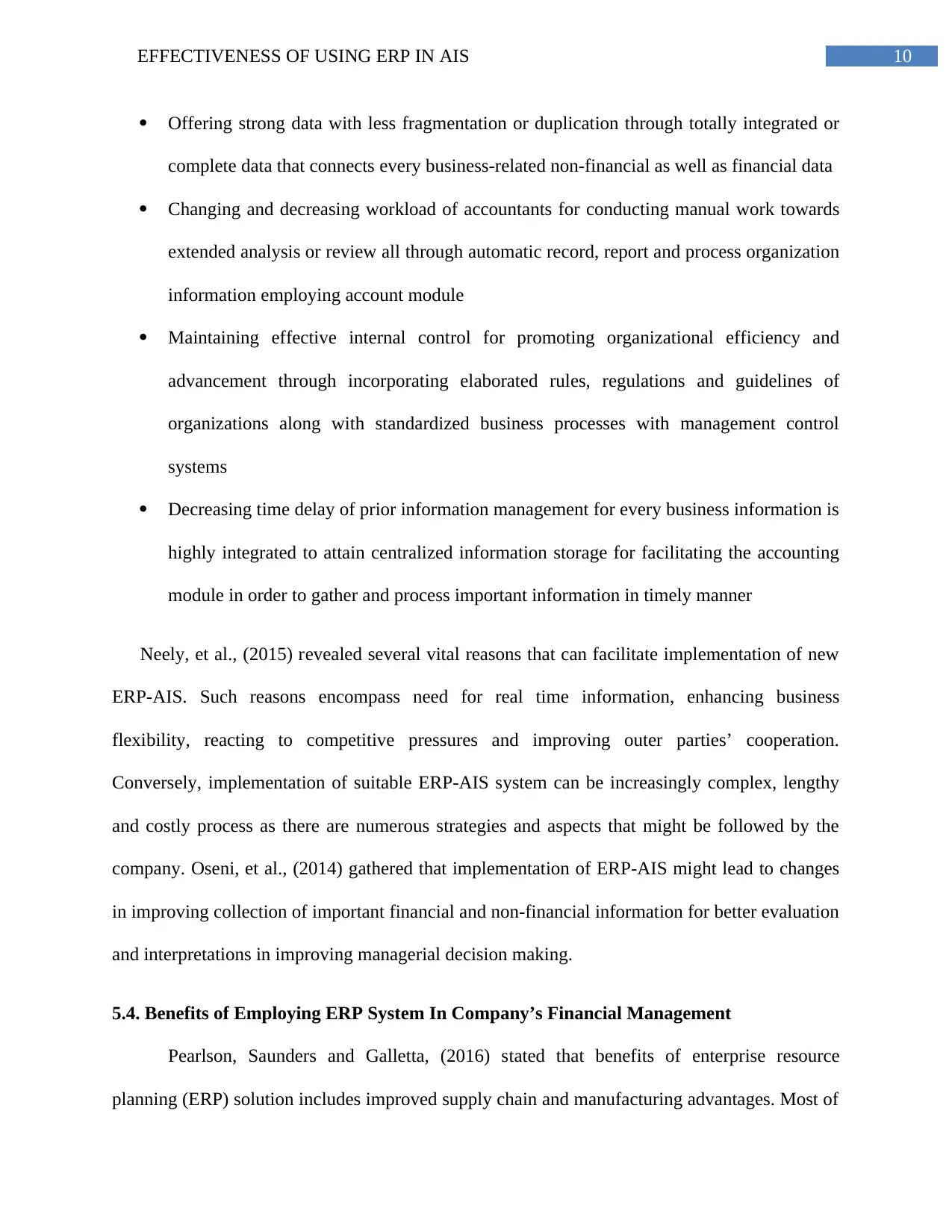
10EFFECTIVENESS OF USING ERP IN AIS
Offering strong data with less fragmentation or duplication through totally integrated or
complete data that connects every business-related non-financial as well as financial data
Changing and decreasing workload of accountants for conducting manual work towards
extended analysis or review all through automatic record, report and process organization
information employing account module
Maintaining effective internal control for promoting organizational efficiency and
advancement through incorporating elaborated rules, regulations and guidelines of
organizations along with standardized business processes with management control
systems
Decreasing time delay of prior information management for every business information is
highly integrated to attain centralized information storage for facilitating the accounting
module in order to gather and process important information in timely manner
Neely, et al., (2015) revealed several vital reasons that can facilitate implementation of new
ERP-AIS. Such reasons encompass need for real time information, enhancing business
flexibility, reacting to competitive pressures and improving outer parties’ cooperation.
Conversely, implementation of suitable ERP-AIS system can be increasingly complex, lengthy
and costly process as there are numerous strategies and aspects that might be followed by the
company. Oseni, et al., (2014) gathered that implementation of ERP-AIS might lead to changes
in improving collection of important financial and non-financial information for better evaluation
and interpretations in improving managerial decision making.
5.4. Benefits of Employing ERP System In Company’s Financial Management
Pearlson, Saunders and Galletta, (2016) stated that benefits of enterprise resource
planning (ERP) solution includes improved supply chain and manufacturing advantages. Most of
Offering strong data with less fragmentation or duplication through totally integrated or
complete data that connects every business-related non-financial as well as financial data
Changing and decreasing workload of accountants for conducting manual work towards
extended analysis or review all through automatic record, report and process organization
information employing account module
Maintaining effective internal control for promoting organizational efficiency and
advancement through incorporating elaborated rules, regulations and guidelines of
organizations along with standardized business processes with management control
systems
Decreasing time delay of prior information management for every business information is
highly integrated to attain centralized information storage for facilitating the accounting
module in order to gather and process important information in timely manner
Neely, et al., (2015) revealed several vital reasons that can facilitate implementation of new
ERP-AIS. Such reasons encompass need for real time information, enhancing business
flexibility, reacting to competitive pressures and improving outer parties’ cooperation.
Conversely, implementation of suitable ERP-AIS system can be increasingly complex, lengthy
and costly process as there are numerous strategies and aspects that might be followed by the
company. Oseni, et al., (2014) gathered that implementation of ERP-AIS might lead to changes
in improving collection of important financial and non-financial information for better evaluation
and interpretations in improving managerial decision making.
5.4. Benefits of Employing ERP System In Company’s Financial Management
Pearlson, Saunders and Galletta, (2016) stated that benefits of enterprise resource
planning (ERP) solution includes improved supply chain and manufacturing advantages. Most of
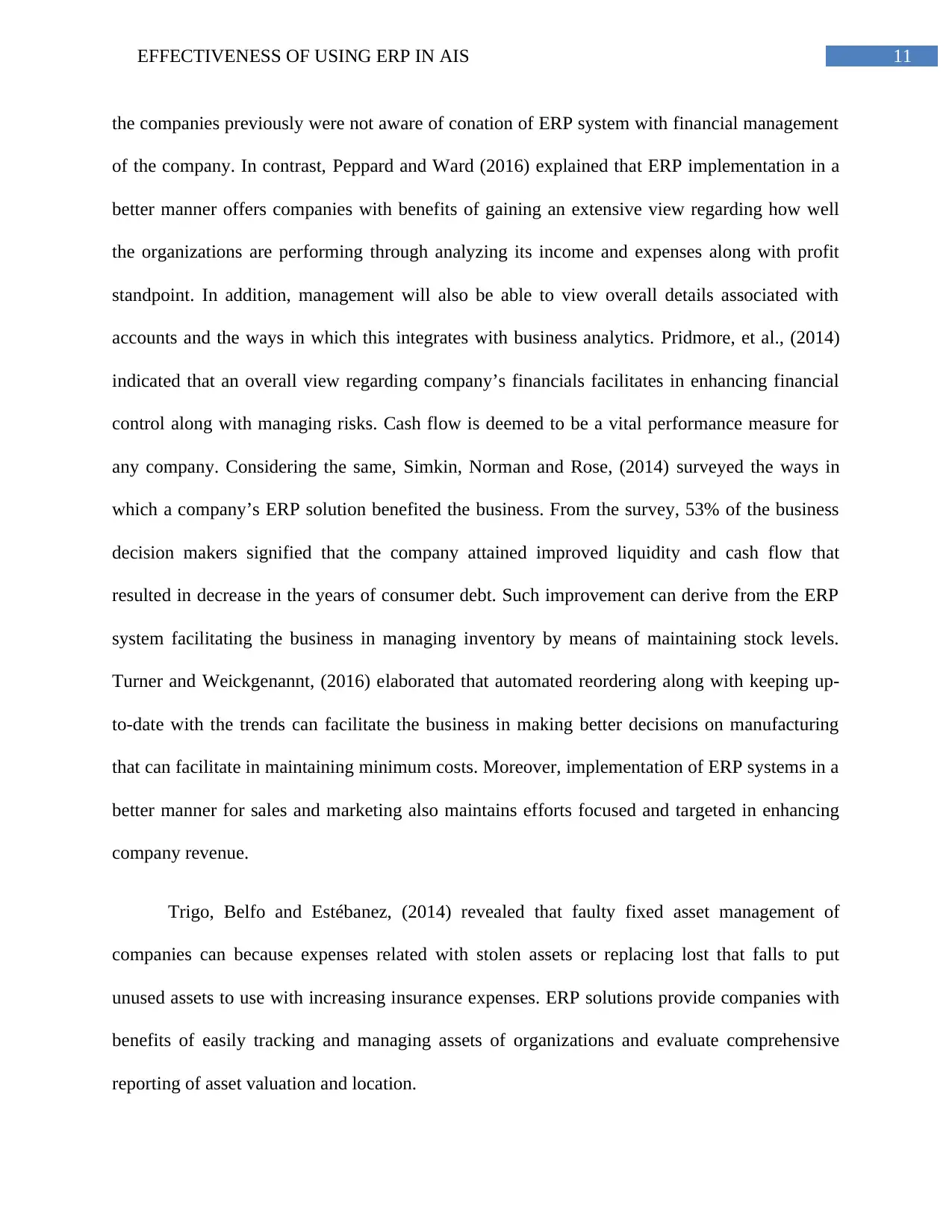
11EFFECTIVENESS OF USING ERP IN AIS
the companies previously were not aware of conation of ERP system with financial management
of the company. In contrast, Peppard and Ward (2016) explained that ERP implementation in a
better manner offers companies with benefits of gaining an extensive view regarding how well
the organizations are performing through analyzing its income and expenses along with profit
standpoint. In addition, management will also be able to view overall details associated with
accounts and the ways in which this integrates with business analytics. Pridmore, et al., (2014)
indicated that an overall view regarding company’s financials facilitates in enhancing financial
control along with managing risks. Cash flow is deemed to be a vital performance measure for
any company. Considering the same, Simkin, Norman and Rose, (2014) surveyed the ways in
which a company’s ERP solution benefited the business. From the survey, 53% of the business
decision makers signified that the company attained improved liquidity and cash flow that
resulted in decrease in the years of consumer debt. Such improvement can derive from the ERP
system facilitating the business in managing inventory by means of maintaining stock levels.
Turner and Weickgenannt, (2016) elaborated that automated reordering along with keeping up-
to-date with the trends can facilitate the business in making better decisions on manufacturing
that can facilitate in maintaining minimum costs. Moreover, implementation of ERP systems in a
better manner for sales and marketing also maintains efforts focused and targeted in enhancing
company revenue.
Trigo, Belfo and Estébanez, (2014) revealed that faulty fixed asset management of
companies can because expenses related with stolen assets or replacing lost that falls to put
unused assets to use with increasing insurance expenses. ERP solutions provide companies with
benefits of easily tracking and managing assets of organizations and evaluate comprehensive
reporting of asset valuation and location.
the companies previously were not aware of conation of ERP system with financial management
of the company. In contrast, Peppard and Ward (2016) explained that ERP implementation in a
better manner offers companies with benefits of gaining an extensive view regarding how well
the organizations are performing through analyzing its income and expenses along with profit
standpoint. In addition, management will also be able to view overall details associated with
accounts and the ways in which this integrates with business analytics. Pridmore, et al., (2014)
indicated that an overall view regarding company’s financials facilitates in enhancing financial
control along with managing risks. Cash flow is deemed to be a vital performance measure for
any company. Considering the same, Simkin, Norman and Rose, (2014) surveyed the ways in
which a company’s ERP solution benefited the business. From the survey, 53% of the business
decision makers signified that the company attained improved liquidity and cash flow that
resulted in decrease in the years of consumer debt. Such improvement can derive from the ERP
system facilitating the business in managing inventory by means of maintaining stock levels.
Turner and Weickgenannt, (2016) elaborated that automated reordering along with keeping up-
to-date with the trends can facilitate the business in making better decisions on manufacturing
that can facilitate in maintaining minimum costs. Moreover, implementation of ERP systems in a
better manner for sales and marketing also maintains efforts focused and targeted in enhancing
company revenue.
Trigo, Belfo and Estébanez, (2014) revealed that faulty fixed asset management of
companies can because expenses related with stolen assets or replacing lost that falls to put
unused assets to use with increasing insurance expenses. ERP solutions provide companies with
benefits of easily tracking and managing assets of organizations and evaluate comprehensive
reporting of asset valuation and location.
⊘ This is a preview!⊘
Do you want full access?
Subscribe today to unlock all pages.

Trusted by 1+ million students worldwide
1 out of 28
Related Documents
Your All-in-One AI-Powered Toolkit for Academic Success.
+13062052269
info@desklib.com
Available 24*7 on WhatsApp / Email
![[object Object]](/_next/static/media/star-bottom.7253800d.svg)
Unlock your academic potential
Copyright © 2020–2026 A2Z Services. All Rights Reserved. Developed and managed by ZUCOL.





